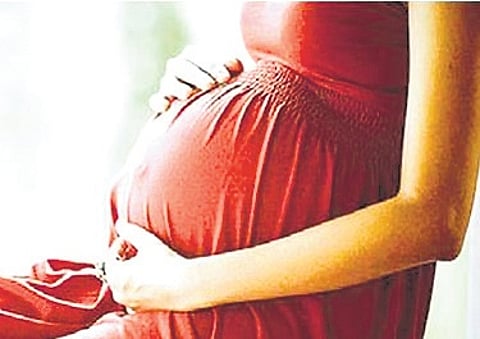Postpartum haemorrhage top maternal death factor in Kerala
KOLLAM: Despite Kerala’s achievements in healthcare, postpartum haemorrhage (PPH) remains the leading direct cause of maternal deaths in the state, according to the Confidential Review of Maternal Deaths conducted by the Kerala Federation of Obstetrics and Gynaecology.
Though PPH, or excessive bleeding after childbirth, continues to be the chief concern, experts warn that hypertensive pregnancy disorders and sepsis are also emerging as significant contributors of maternal deaths.
Of the 609 maternal deaths recorded between 2020 and 2024, 70 were attributed to obstetric haemorrhage, including five cases where women died en route to hospital care. From 2021 to 2024 alone, among 522 recorded maternal deaths, 38 were caused by hypertensive disorders of pregnancy, such as preeclampsia--making it the second leading cause of maternal mortality after haemorrhage.
The review further flagged that 22 of those 38 hypertensive cases progressed to eclampsia, a severe condition involving seizures in pregnant women with high blood pressure. Additionally, 13 cases were associated with HELLP syndrome, a life-threatening complication considered a variant of hypertensive pregnancy disorder.
Maternal sepsis — defined as life-threatening organ dysfunction resulting from infection during pregnancy — was cited in 16 of the 522 deaths. “PPH is still the most common cause of maternal deaths. However, hypertensive pregnancy disorders and sepsis have become dangerous emerging trends.
We are seeing increased incidence of high blood pressure among young women, which was rare in the past. This could be due to unhealthy lifestyles, poor diet, lack of exercise, and stress,” said Dr Leema R, senior gynaecologist at Women and Children Hospital, Thiruvananthapuram.
Dr Leema stressed the need for robust diagnostic protocols and rapid interventions. “Prompt and effective management of high blood pressure is crucial to avoid complications like cerebral haemorrhage, the most common cause of death in preeclampsia patients,” she said.
On sepsis, she added, “It can result from postpartum infections, so maintaining hygiene throughout pregnancy is critical. We are also seeing more cases where standard antibiotics are ineffective due to growing resistance. This area needs further research.”
Dr Unnikrishnan, a senior gynaecological surgeon based in Kollam, said proper management of labour is key to reducing maternal mortality. “PPH can often be prevented with active management during delivery. But this requires skilled staff and infrastructure,” he said.
He said while local representatives demand labour facilities in taluk hospital and primary health centres, this is not always feasible. “Unfortunately, most taluk hospitals lack the necessary infrastructure and trained staff. Strengthening these facilities should be a priority,” he noted.

